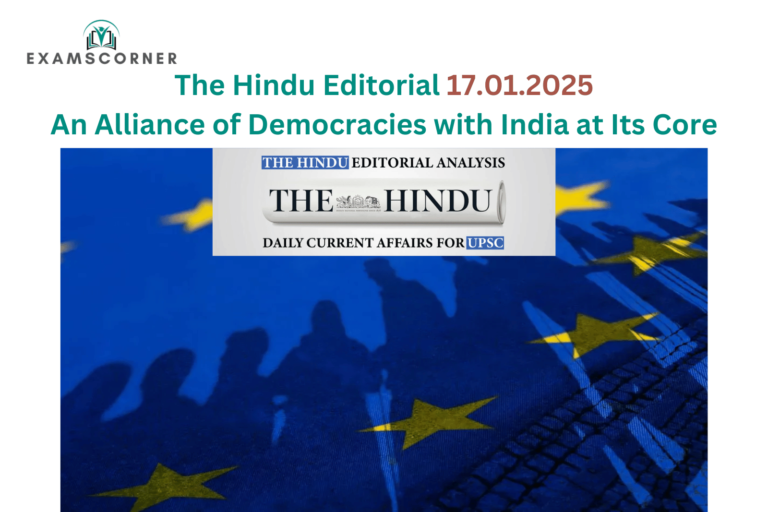Introduction
The year 2024 was a super-election year worldwide, and 2025 must become the year when the world’s democracies regroup and find new ways to support each other. Nowhere is this truer than in the relationship between Europe and India, a partnership that, for too long, has been heavy on strategies but light on delivery. For nearly 17 years, European Union (EU)-India relations have been dominated by on-and-off Free Trade Agreement negotiations. The collaboration of the world’s largest democracy and its biggest trading bloc to counter protectionist headwinds would be an economic and geopolitical game-changer.
Context: Europe and India need a more practical relationship; together, Europe, India, and the United States can be unstoppable.
Look at the Bigger Picture
- Trade Deal: If a comprehensive trade deal eludes us in the short term, another track should be pursued outside traditional bureaucratic negotiations.
- Political Focus: High-level political collaboration should prioritize geostrategic issues like economic security, defense cooperation, and shared agendas for space, emerging technology, and critical industries like pharmaceuticals.
- Frustration with India: Europe’s geopolitical frustrations stem from India’s response to Russia’s invasion of Ukraine and its continued ties with Moscow.
- Historic Ties: India’s relationships with Russia are rooted in history.
- India-China Rivalry: Despite substantial trade and cooperation through BRICS, India’s rivalry with China remains broad and deep.
India’s Position
- Economic Reluctance: As a growing economy, India resists being drawn into power competitions dividing the world into democratic and autocratic blocs.
- Democracy and Ties: However, India’s democratic nature makes its ties with Moscow and Beijing increasingly unnatural.
- Double Standards: India’s accusations of Europe’s double standards hold merit, particularly given Europe’s economic dependencies on China.
Restart in Relations
- Common Assessment: A renewed partnership should start with a mutual understanding that Russia and China’s “No Limits” partnership threatens the global democratic order, which includes India, Europe, and the United States.
- Atlantic-Indo-Pacific: Events in the Atlantic and Indo-Pacific are deeply interconnected.
- Trade and Investment: Practical measures to break down trade barriers while bolstering joint security should take precedence.
- Reducing China Dependency: Europe must reduce its reliance on China in areas like critical raw materials, building new supply chains with India as a “Trusted Partner.”
Defense and Trade
- India-U.S. Defense Ties: India and the U.S. enjoy robust defense cooperation, with India designated as a “Major Defense Partner” and a key member of the Quad, often called the “Asia-Pacific NATO.”
- Europe’s Support: Europe should back this alliance, offering India greater security assurances.
- EU-India Defense Discussions: EU-India defense talks must accelerate to bring investments into defense industries and offer India better weaponry than Russia.
- EU Defense Commissioner: The EU’s Defense Commissioner should visit India to expand collaboration in defense and space, where both parties have ambitious plans.
Trade and Technology Council (TTC)
- India-EU TTC: The India-EU TTC, modeled on the EU-U.S. Council, requires renewed vigor to coordinate technology agendas.
- Uncertainty with EU-U.S. TTC: The future of the EU-U.S. TTC under a potential Trump presidency remains uncertain.
- U.S.-India iCET Inspiration: Collaboration can draw inspiration from the U.S.-India Initiative on Critical and Emerging Technology (iCET), which operates at the National Security Adviser level.
Emerging Technology Race
- Global Challenge: The Australian Strategic Policy Institute highlights that China leads in 57 out of 64 tracked emerging technologies, followed closely by the U.S.
- India’s Role: India is emerging as a significant hub for global research innovation, alongside key European countries.
- Collaborative Success: Democratic nations can lead in technologies like quantum computing and advanced biotech by uniting efforts.
- Countering China: A unified front is essential to prevent China from dominating these critical sectors.
In Perspective
- Practical Relationships: Europe and India should focus on tangible connections, including stronger people-to-people ties.
- Europe’s Benefits: Partnering with India is vital as it is poised to become the world’s third-largest economy within the next decade.
- Broader Prize: Together, Europe, India, and the U.S. can form an alliance of democracies, with India at its core.
Conclusion
If Europe wants India to anchor itself in this alliance, a shift in approach is necessary. Acknowledging and addressing challenges to democracy in both regions can strengthen ties. Together, Europe, India, and the United States are individually powerful but collectively unstoppable against authoritarian threats.



